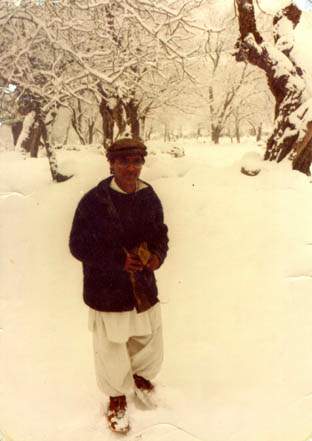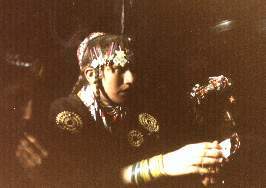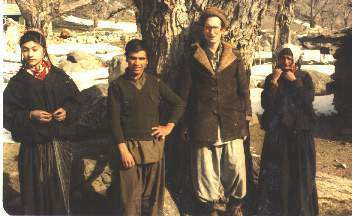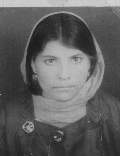
I met Abdul Khaliq in the Summer of 1979, just after I had finally agreed to divorce Sahib Delan. I had agreed to the divorce because somebody told me that I could always marry her again. I did not know that there is a Islamic rule that if a man divorces his wife, he cannot marry her again until she marries another man, has sexual intercourse with that other man at least one time, and then is divorced from him.

|
After my divorce, I was probably the only foreigner who ever came to Chitral who had never been to the Kalash valley of Bumboret, so I decided to go there. The first night I arrived in Bumboret, I met Abdul Khaliq. I believe that he already knew about me, as I was already famous in Chitral. He told me that if I wanted to marry any Kalash girl in Bumboret, I need only to point her out to him and he would arrange the marriage.
The next day, I went around and looked at all the Kalash girls in Bumboret. This was easy to do, as the entire population was only about one thousand, and they had all assembled for a funeral which was taking place. Finally, I found Afiyat, the most beautiful Kalash girl. I went and told Abdul Khaliq about her. What happened next was fantastic and unbelievable. The word spread and, within a half hour, the entire Kalash population of Bumboret knew that I was getting married to Afiyat. The people were very happy. Many Kalash men and women came and introduced themselves to me as my in-laws.
There was only one person who was not enthusiastic about this marriage. That was Afiyat herself. She said that she could not marry without permission of her parents.

|
However, there was a small catch. The mother and father of Afiyat were not in Bumboret. They were in Achulga, a remote and isolated valley which could only be reached by crossing an 11,000 foot high mountain pass.
No problem, I thought, I had just climbed 10,000 foot Lowari top to get into Chitral. What could another one thousand feet mean.
So, Abdul Khaliq and I started off on a journey to Achulga. Abdul Khaliq was in much better condition than I. He lived all his life in those mountains and could just run up the mountain side. I had to follow far behind, very slowly.
When we reached the top, there were two paths: one going to the right and one going to the left. Abdul Khaliq did not know which one to take. Finally, he decided we should take the path to the left, which was a mistake.
As we trudged along mile after mile, I felt that we were still going up. We were not going down to the pasture at the bottom where Afiyat’s parents were living. In reality, we were approaching the border with Afghanistan.
Finally, I told Abdul Khaliq we were obviously going the wrong way. We should just go straight down the mountainside to the valley.

|
It was now dusk, but not completely dark. A herd of mountain goats came by. Then came their goat herder. He was startled to see me and pointed his rifle at me. "Kicha Asus" I said to him in Khowar, which means "How are you". He seemed relieved to hear that and lowered his rifle.
Every time I have seen that man since, he has said that he almost shot and killed me that night. He had 200 goats. Afghans often come across the mountain tops and kill the goat herder and steal the goats. He thought I was from Afghanistan and he wanted to shoot me before I shot him.
The goat herder took me down to his camp. I called for Abdul Khaliq and he came back up and joined us. We spent the night with the goat herder. He had a partner. There were actually two goat herders, and about 200 mountain goats.
Each goat had a name. They milked all the goats, calling out their names. The goat herders could tell the goats apart, even though they all looked the same to me.
The next morning, Abdul Khaliq and I started down to the bottom of the valley. Just as we were getting near the field where the parents of Afiyat lived, Abdul Khaliq turned around and asked me to give him more money. I had no choice but to agree. I was not happy about this. I still suspect that he took me up the wrong path to get more money out of me.
Finally, we reached the house of the parents of Afiyat. Her father had converted to Islam, but his wife was still Kalash. We politely decided to overlook this violation of Islamic law.
The parents of Afiyat were very happy for me to marry their daughter. They gave us their blessing.
It took only four hours for Abdul Khaliq and I to walk back from Achulga to Bumboret, now that we knew the way.
However, when we got back, we could not find Afiyat in her village of Anish. Finally, I climbed high up the hillside where the Kalash build their houses and I saw Afiyat working in the cornfield below. I went down to the cornfield but Afiyat was not there. I went back up the hill and saw Afiyat in the field again. I went down and she had disappeared again. This continued several more times.
Finally, I sent Abdul Khaliq without me. He found Afiyat and spoke to her. He reported that that she did not want to be married to me. That was the end of that, although the Kalash people all kept insisting that I should marry Afiyat.
A few days later, I was walking on the road near Brun Village when I saw a young girl sitting on the hillside. She called me to her. She said "Afiyat ta bok" meaning "Afiyat is your wife". I replied, in Khowar, that I was not marrying Afiyat because she did not want me. "Ko no", she replied, meaning "Why not".
The name of this girl was Sunik. Just as I was talking to her, it started to rain. We had to go look for shelter. We became separated. A few hours later I took a jeep back to Chitral Proper.
One week later, a Kalash man came to the home of Mohammed Nadir in Goldur, where I was staying. This man told us that a Kalash girl wanted to marry me. Her name was Sunik. She had just converted to Islam so that she could be married to me.
Mohammed Nadir and I went to Bumboret. Nadir had never in his life been to the Kalash Valleys, but I brought him along as a translator. We found Sunik, who was now staying in the home of a Muslim family in Kandisar. They wanted me to pay a lot of money for the marriage to Sunik, but I did not have much money. Finally, they brought Sunik out and she made it clear that she wanted to be married to me without conditions. After this was settled, Mohammed Nadir took leave and went back to Chitral, saying that we did not need him to translate any more.
For the marriage, we needed a mullah. The Big Mullah of Bumboret was summoned. He arrived. He was just getting ready to pronounce us man and wife when a message came that the police were searching for us. I was not concerned about this. I told the mullah to continue with the marriage ceremony, but the Big Mullah was afraid to perform the marriage if the police were looking for us.
A few minutes later, the police arrived. They said they had orders to bring me and the girl to Rahmat Ghazi Khan, the chief officer of Chitral. They put Sunik and I in a jeep, side-by-side touching in view of the fact that we were considered to be almost married.
When we got to Ayun, we found out that the father of the girl, a rough man who climbed the mountains even though he did not have shoes, objected to the marriage and had complained to the police. He was waiting for us in Ayun. He said that his daughter was still Kalash and was not really Muslim. The police took the three of us to Chitral.
We arrived at the home of the Chief Officer of Chitral. The father of the girl argued that the marriage should not be allowed. The girl insisted on being married to me. After a long shouting argument, Rahmat Ghazi Khan said we should take a room for the night at the Shapnam Hotel in Chitral Proper, a small hotel near the bridge where Kalash often stay, and come to his office tomorrow.
When we reached the street, suddenly the father grabbed his daughter by the hand and dragged her down the street. He even dragged her along the ground. Local women are never seen in public in the Chitral Bazaar, and here was a local woman being forcibly dragged down the street. There was a big commotion, as hundreds of men gathered to watch.
Finally, we reached the jeep station, near where the Shapnam Hotel is located. The father said we should take a jeep to Ayun and stay there. Foolishly, I agreed to engage a jeep for Ayun.
When we arrived by jeep in Ayun, I got out of the jeep, along with Sunik and her father. I turned to pay the jeep driver. After I had paid him, I turned around to see Sunik, but Sunik and her father were gone. He had dragged her away. I never saw Sunik again.
Nadir and I later went to see Maulana Owir in Ayun. Maulana Owir was an old man and was the big religious authority in Chitral. He ruled that I was not allowed to marry a Kalash girl until she had been Muslim for three months. He told me to return to America and wait three months.
I returned to America. Three months later, I received a letter from Shaikh Abdul Rehman, a cousin of Sunik. In this context "shaikh" means a convert to Islam. He had previously been Kalash. The letter said that Sunik wanted me to come to Chitral to marry her.
I could not come right away. Finally, I borrowed $4,000 from my friend Richard Reynolds, a floor broker on the American Stock Exchange, and made the trip to Chitral. On February 3, 1980, I crossed on foot the 10,000 foot high Lowari Top into Clitral. Three days later, three men were killed by avalanche at the exact spot where I crossed.
When I reached Bumboret, I found out that eight days earlier Sunik had been forcibly married by her father to another man. Her new husband was a rough man who made a living by carrying 100 pound sacks of wheat on his back eight miles from Ayun to Bumboret. Sunik had fought with her father over this. She had kept saying she did not want to be married to that man. She had wanted to be married to Ismail. Finally, she had made a deal with her father. If Ismail did not come by a certain date, she would be married to that man. When I did not come by the date, the marriage took place. I arrived eight days later.
Some of the people were very upset about this. I had the letter to prove that Sunik had wanted to be married to me. They felt I had been cheated. Therefore, several local people in Drosh resolved to find me a suitable wife to take her place. They found a girl in Damik near Jinjoret named Honzagool to become my wife in place of Sunik.

|
I came to Chitral again in 1981 and 1983. I saw Afiyat briefly in 1981. By then, she had married but was no longer with her husband. In 1983, I found out that Abdul Khaliq was living in University Town in Peshawar, working for an international organization helping the Afghan refuges called SERV. At night, I went to a SERV house searching for Abdul Khaliq. I knocked on the door. A man opened and invited me in. He offered me tea. He told me he was an Afghan refugee who had been in jail in Jalalabad. Then, he told me that there had been a foreign man with him in Jalalabad prison. He described that man, whom he said had been held as a spy.
"Was he a good man or a bad man", I asked.
"I think he was a good man," he replied.
"And was he a spy," I asked.
"No, he was not a spy", he said.
"Then, I am that man," I said.
This man was Akhtar Jan, who had been my friend in the jail in Afghanistan. He told me about which of our fellow prisoners had been executed and which had been released.
A few months later, Akhtar Jan wrote me a letter saying he was applying for a scholarship to attend university in England and he wanted me to write a letter of recommendation. I wrote the letter and mailed it, but never heard from Akhtar Jan again.
I eventually found Abdul Khaliq, who was also working for SERV. Abdul Khaliq said he was Christian now and no long Kalash. I did not believe him.
Although Abdul Khaliq is a Muslim name, Kalash men usually take Muslim names to hide their true religion.
Ismail Sloan
Here are links: